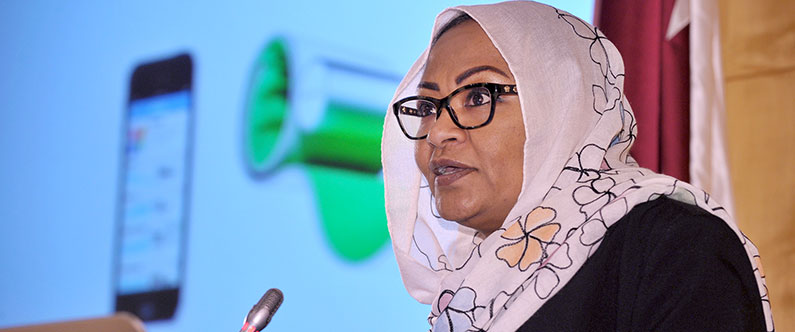WCM-Q expert discusses hypertension and how to beat it
 Dr. Mai Mahmoud, assistant professor of medicine at WCM-Q.
Dr. Mai Mahmoud, assistant professor of medicine at WCM-Q.
High blood pressure (hypertension) and ways to avoid it by adopting healthy lifestyle habits were discussed at the latest installment of WCM-Q’s Ask the Expert series.
Dr. Mai Mahmoud, assistant professor of medicine at WCM-Q, spoke to members of the public about the causes and symptoms of hypertension, as well as the health risks the condition carries, such as increased likelihood of heart disease, stroke and kidney damage.
Hypertension is defined as blood pressure of 140/90mmHg or higher in one number or both. Around 90 percent of people diagnosed with hypertension have what is known as essential or primary hypertension, which simply means that there is no known cause of their condition. However, a combination of genetic and environmental factors may play a role in bringing on the condition, explained Dr. Mahmoud. For example, people are more likely to suffer hypertension if they are obese, suffer from insulin resistance, high blood lipids (fats), or if they consume large amounts of alcohol or salt. The risk of suffering hypertension is increased in people aged over 60 years and in people of black ethnicity. Less than 10 percent of hypertension cases have a known cause, some examples of which are kidney disease, increased levels of some hormones like cortisol and aldosterone, and other rare causes.
Dr. Mahmoud said: “Hypertension is associated with increased risk of suffering quite serious health complications, including stroke and heart attacks, but the good news is that in many cases the complications are preventable by treating blood pressure with medications and making small positive changes to our lifestyles.
“Taking regular exercise, eating a healthy, balanced diet that incorporates plenty of fresh fruits and vegetables, cutting down on caffeine and quitting smoking can all help to reduce high blood pressure and even impede the progression from prehypertension to full-blown hypertension.”
However, Dr. Mahmoud stressed the importance of seeking regular professional help from a qualified physician for those suffering with hypertension. Studies have shown that blood pressure measurements taken in clinical settings by professionals sometimes return higher readings than those measured at home with a personal monitor, a condition called ‘white coat hypertension’. If there is discrepancy your doctor needs to know and may recommend 24-hour ambulatory monitoring of blood pressure. This involves wearing a small device that automatically measures blood pressure and can be worn while doing regular activities for 24 hours.
“While I want everyone to understand that there is a lot we can do ourselves to keep our blood pressure at a healthy level, it is very important that anyone with hypertension sees their doctor regularly and adheres to their diet and takes their medicine. Many classes of medications are available that bring blood pressure under control,” she said. “Depending on the readings of blood pressure and other comorbid conditions, such as diabetes or kidney disease, your doctor may prefer certain medications over others. Most people require two to three drugs to control their blood pressure.”
The Ask the Expert series is part of WCM-Q’s Sahtak Awalan – Your Health First campaign. The interactive presentations are free to attend and feature an interactive Q&A session that allows audience members to ask follow-up questions about the topic.
Dr. Mahmoud also said that it was important for everyone to have his or her blood pressure checked regularly. “Hypertension does not have many obvious symptoms and the first symptom could be a stroke or heart attack, so it is important to visit the doctor regularly to have your blood pressure checked. It is recommended for adults aged 18 and older to have their blood pressure checked every two years and every year after the age of 30 or if their blood pressure is in the prehypertension range (120-139/80-89mmHg).
“Diagnosis usually requires two readings one week apart unless it is extremely high, which warrants immediate intervention. It is also a good idea for those with normal blood pressure to follow healthy lifestyle habits in order to minimize the risk of developing hypertension.”